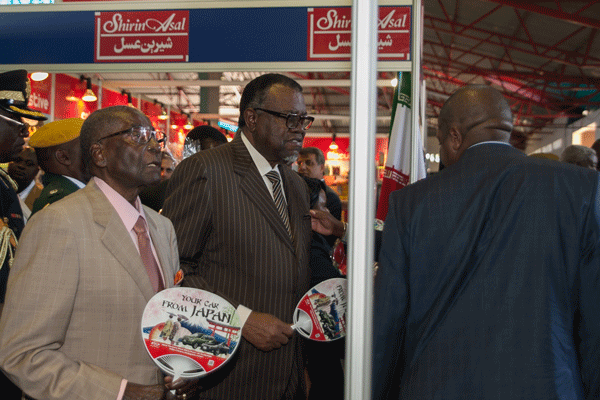
THE just-ended 58th edition of the Zimbabwe International Trade Fair (ZITF) can be described as both a success and a failure.
BY MTHANDAZO NYONI

Running under the theme Harnessing Linkages for Industrial Development, the 2017 ZITF edition attracted 367 direct exhibitors, compared to the closing total of 354 last year.
It was officially opened by Namibian President Hage Geingob.
However, the fair pales into insignificance when compared to yesteryear events, although it holds its own when it comes to meeting industry expectations in terms of conferences.
“The fair presented a fantastic platform for dialogue in the form of the National Economic Consultative Forum (NECF) Business Conference and CZI manufacturers breakfast meetings,” said Confederation of Zimbabwe Industries president, Busisa Moyo.
“Traffic through the ZIEC [Zimbabwe International Exhibition Centre] was lower than last year in our assessment, but engagement between buyers and sellers was robust. The public days will present an opportunity to make the public aware of locally-manufactured products.
“The overall view is that the fair has been ‘fair’. Industry and private sector need to take the lead role and be more prominent and less of parastatals and government departments since it is a ‘trade’ fair. There should be a separate event for public services,” he said.
- Chamisa under fire over US$120K donation
- Mavhunga puts DeMbare into Chibuku quarterfinals
- Pension funds bet on Cabora Bassa oilfields
- Councils defy govt fire tender directive
Keep Reading
During the fair, a number of business conferences were held. These included the Original Equipment Manufacturers Forum (OEMF), as well as NECF forum.
The OEMF forum sought to address Zimbabwe’s industry constraints of declining capacity utilisation, antiquated machinery and lack of competitiveness in regional markets as well as capital constraints.
Zimbabwe National Chamber of Commerce president Davison Norupiri said ZITF this year was on the low side in terms of turnout.
“I think ZITF this year is a little bit on the low side in terms of turnout. I feel we still have more to do to market the fair. However, on the first day there were quite a number of people who were making enquiries. I think we can do better. The conferences were quite informative and rich,” he said.
An economist, Reginald Shoko said the trade fair was slowly becoming a ritual more than a business platform. He said the limited foreign participation was testimony of the value of business one can get from the fair.
“The trade fair has been stagnant for years now; it’s sliding into a glorified flee market. Industry might gain through the interactions with the consumers and have been afforded the platform to explain their products to consumers beyond that I don’t think there has been an industry to industry trade benefit of worth,” Shoko said.
Only 13 foreign countries participated at the fair out of 19 recorded last year.
These included Botswana, China, Ethiopia, Germany, Indonesia, Iran, Japan, Kenya, Malawi, Mozambique, Namibia, South Africa and Turkey.
Such a development calls for urgent intervention from both government and organisers if the fair is to remain relevant.
A tour of the ZITF grounds during this year’s showcase also presented a glaring contrast to yesteryear exhibitions.
The first traders’ day was rather subdued, although visitors and exhibitors kept spirits high. An expectant ambience was definitely present but interviews at various company stands drew the call for improvement.
Quite a big number of Bulawayo companies did not participate at this edition of the trade fair. According to ZITF Company general manager, Nomathemba Ndlovu, the number of Bulawayo companies that exhibited at the fair remained low, comprising just 28% of Zimbabwean participants as the local economy continues to struggle.
Harare companies made up 63%, while the balance was coming from other cities around the country, she said.
Many large companies that form the backbone of Bulawayo’s industry have either closed shop, liquidated or been placed under judiciary management.
A survey by The Standard revealed that there was more vacant space this year as compared to yesteryears. This was most glaring in Hall 2.
“The fair was good to us because we managed to get potential leads that we are going to follow up after the show. We are looking forward to good business. However, we noted that there is more vacant space and I believe ZITF organisers could allocate bigger spaces for those who would have exhibited. The fair helps us to meet with our end users and explain to them our products. Otherwise, the fair was fairly organised,” PPC Zimbabwe sales consultant Wonderful Dube, said.
Many exhibitors complained about the high cost of exhibiting space, saying this could have been reduced. Such high exhibiting costs, they warned, stood to chase away potential exhibitors.
Exhibitors also complained about high accommodation cost which ranged around $300 per night at some hotels during the ZITF days.
Small-to-Medium Enterprises representative, Raviroyashe Muzvidziwa said the fair was a success as they managed to get clients who were asking about their products.
“We are expecting some deals after the fair and we look forward to coming again next year,” she said.
Another exhibitor said participating at the ZITF this year was hard due to financial challenges. Zimbabwe is currently going through a cash crisis which has seen banks putting cash withdrawal caps.
“Business volumes picked up yesterday [Thursday] and it’s promising to be even better today [Friday]. However, compared to last year, this was more challenging due to financial problems,” said the exhibitor who requested anonymity.
Analysts and industrialists said there was need for government and ZITF organisers to wake up and smell the coffee lest the fair crumbled.
Norupiri suggested that ZITF should come up with some sort of training for exhibitors “because definitely, we need that so that we can compete with other countries”.










